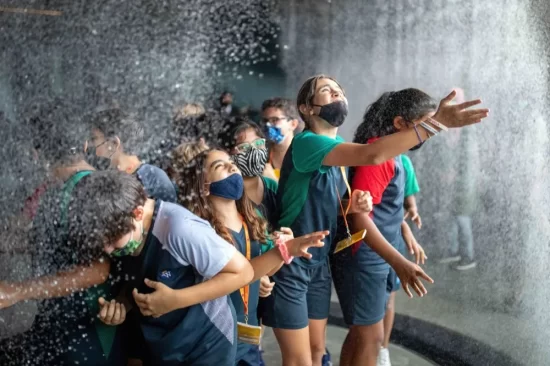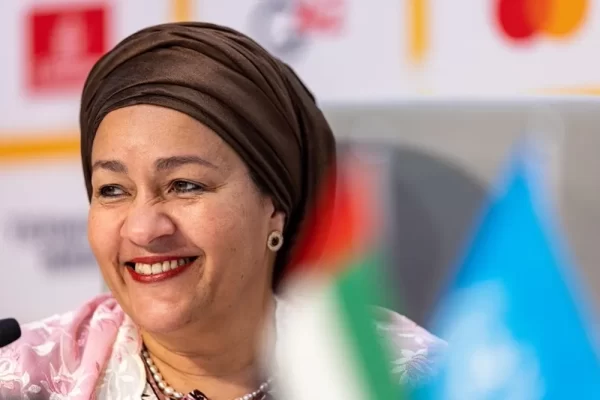DUBAI, 21 January 2022 – The power of the Fourth Industrial Revolution, with its shift towards automation and data exchange, has the potential to create a more efficient, prosperous future, but its benefits may not be distributed equitably among marginalised communities, developing countries and genders.
These were the concerns being raised during three separate World Majlis sessions as part of Expo 2020 Dubai’s Global Goals Week, where leaders from government, social enterprises, academia and inter-governmental organisations, discussed the numerous risks, honing in on emerging technologies and renewable energy, and shared different approaches on how to overcome the barriers, from value-driven partnerships to debunking stereotypes.
Ambassador David Donoghue, Former Permanent Representative to the United Nations, Ireland, who co-chaired the Sustainable Development Goals (SDGs) negotiations, said: “We talked a lot about technology and technology transfer when we were negotiating the SDGs – but the distinction between the different technologies [machine learning and robotics etc] was not present at that stage… Now we have a much greater sense of their potential, but we are also much more aware of the threats.
“The human focus of the SDGs – as a people-centred agenda with a slogan to leave no-one behind – could perhaps be jeopardised, and our focus was on the most marginalised groups. There is a risk with the indiscriminate use of technologies that we’re not able to get the full benefit of the SDGs.”
Oliver Kraft, Executive Vice President – Expo 2020 Dubai, Siemens, said: “In small communities, much like in a smart urban environment like Expo 2020 Dubai, we are moving away from traditional customer-supplier relationships, which are specification-based, towards value-driven partnerships. Through this approach, we create ecosystems like what Expo is doing with District 2020, that can also include competitors. In this day and age, you partner with competitors one day, and in another you compete with partners… but this is really what drives collaboration, and this is what it’s got to be like in the Fourth Industrial Revolution.”
Sustainable energy is a crucial component of development, with strong links to other SDGs such as education and gender equality, yet it is still considered expensive to many, and there are many considerations to ensure it is continuously accessible and affordable.
Fahad Alajlan, President, King Abdullah Petroleum Studies and Research Centre (KAPSARC), KSA, said hydrocarbons would still play a role in the road to sustainable energy for the sake of developing countries that may not be able to afford to rely on renewables, and to avoid a volatile transition.
Meanwhile, Irene Cañas Díaz, Executive President, Instituto Costarricense de Electricidad-ICE, Costa Rica, explained how her country, which is almost completely reliant on renewables, has prioritised affordable and accessible energy storage.
Ali Zerouali, Director of Cooperation and International Development, Masen, Morocco, revealed how Morocco has innovated to alleviate the challenges in Africa, where more than 600 million people do not have access to energy or electricity. Through the technical, legal and financial structuring of projects, Morocco has created 20 bilateral agreements with countries that feed into the Desert to Power Initiative for Africa, which aims to bring electricity to 250 million people in the Sahara region.
Morocco’s work with the Islamic Development Bank has also resulted in concrete projects in, for example, Niger and Djibouti, to accelerate the development of renewable energy, while the Moroccan-Ethiopian Coalition for Sustainable Energy Access aims to transfer know-how from the most advanced southern countries, in terms of energy production, to the least. Meanwhile, Polina Lion, Head of Sustainable Development Department, ROSATOM, Russia, described the impact of the company’s nuclear power plants, such as those in Bangladesh, which will boost economic growth by two per cent annually and create 20,000 jobs.
No matter the approach, women and girls are central for the achievement of the 2030 agenda. Ambassador Donoghue said: “There is no one SDG that is more important than the other, but SDG 5 [gender equality] is an enabling goal that opens possibilities across all of the other SDGs. The general approach to the SDGs post-COVID is that we need them in order to build back better, and considering that women, especially in the global south, have suffered from COVID, then it [SDG5] is the most important one to address as we go into 2022.”
Ensuring equal access to education and work opportunities for females must go hand-in-hand with addressing stereotypes and cultural norms. Lea Giminez, Former Minister of Finance, Paraguay, said: “Throughout our globalised work cultures, we have learned to favour characteristics that are more likely to be common among men; aggressiveness over responsiveness, competitiveness over collaboration
“First, this puts the responsibility of achieving gender equity in leadership on women, suggesting you are the problem because you have to be more aggressive. Second, it implies that there is something wrong with alternative forms of leadership. Third, it ignores the many barriers that professional women face daily.”
Samar Al Shorafa, Founding CEO, She is Arab, UAE, said: “We have countries in the Arab world, for example, where women make up more than 50 per cent of graduates in STEM fields, but end up unemployed. The missing link there is culture, and this is a major impediment for women, not just in this region but around the world.”
Leena Al Olaimy, social innovator and author, Bahrain, added: “We need to transform the system, building not just 21st century skills, but 21st century values.”
Running from 15-22 January, Expo 2020’s Global Goals Week, in association with the United Nations, aims to raise awareness of the Sustainable Development Goals (SDGs) at a critical time of uncertainty in the midst of the pandemic.























